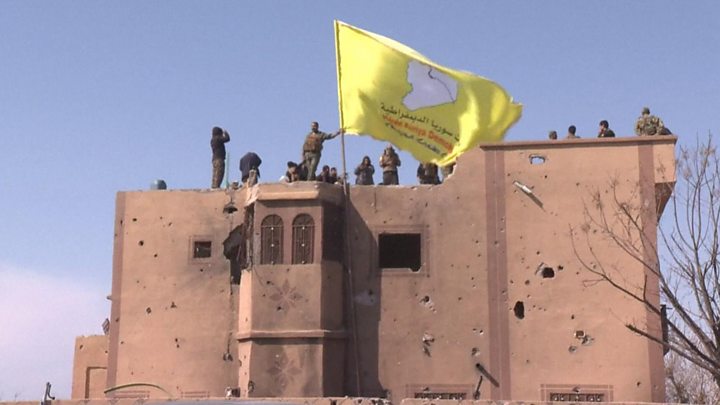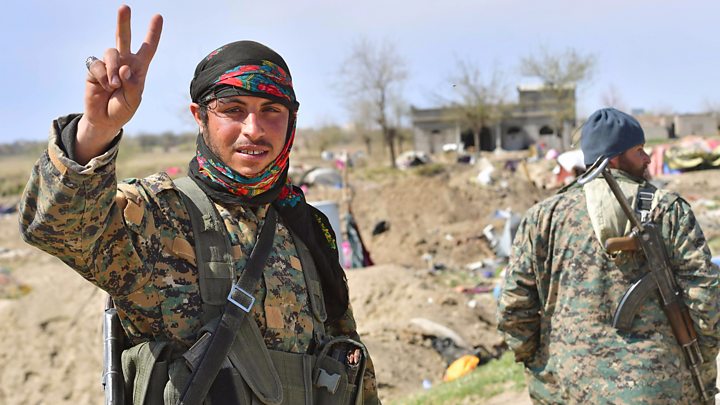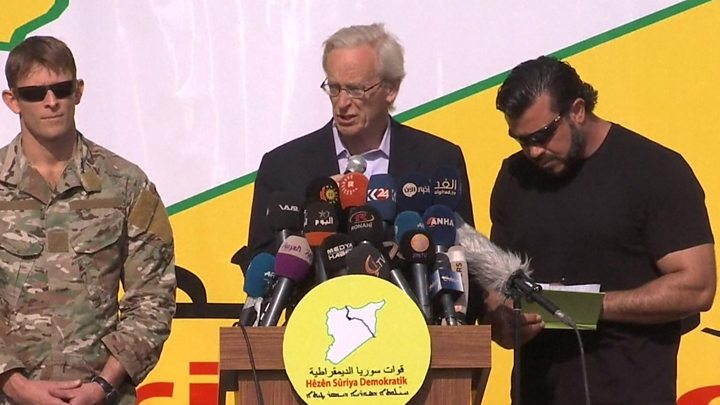
Media playback is unsupported on your device
US President Donald Trump welcomed the fall of the Islamic State group's five-year "caliphate", but warned that the terror group remained a threat.
Mr Trump's remarks came after Kurdish-led Syrian Democratic Forces (SDF) raised victory flags in the Syrian town of Baghuz, IS's last stronghold.
He said the US would "remain vigilant until [IS] is finally defeated".
Despite losing territory in Syria and Iraq, IS remains active in countries from Nigeria to the Philippines.
At its height, the group controlled 88,000 sq km (34,000 sq miles) across Syria and Iraq.
After five years of fierce battle, though, local forces backed by world powers left IS with all but a few hundred square metres near Syria's border with Iraq.
On Saturday, the long-awaited announcement came from the SDF that it had seized that last IS territory. Western leaders hailed the announcement but emphasised that IS was still a danger.
"We will remain vigilant... until it is finally defeated wherever it operates," Mr Trump said in a statement.
French President Emmanuel Macron said "the threat remains and the fight against terrorist groups must continue".
UK Prime Minister Theresa May welcomed the "historic milestone" but said her government remained "committed to eradicating [IS's] poisonous ideology".

Media playback is unsupported on your device
Trump statement
In a statement released by the White House on Saturday, Mr Trump said the US would "continue to work with our partners and allies... to fight [IS] until it is finally defeated."
"The United States will defend American interests whenever and wherever necessary," the statement read.
Mr Trump described IS's loss of territory as "evidence of its false narrative", adding: "They have lost all prestige and power."
He also appealed to "all of the young people on the internet believing in [IS] propaganda", saying: "Think instead about having a great life."

Media playback is unsupported on your device
How did the final battle unfold?
The SDF alliance began its final assault on IS at the start of March, with the remaining militants holed up in the village of Baghuz in eastern Syria.
The alliance was forced to slow its offensive after it emerged that a large number of civilians were also there, sheltering in buildings, tents and tunnels.
Thousands of women and children, foreign nationals among them, fled the fighting and severe shortages to make their way to SDF-run camps for displaced persons.
Many IS fighters have also abandoned Baghuz, but those who stayed put up fierce resistance, deploying suicide bombers and car bombs.
Why are there still concerns about IS?
IS grew out of al-Qaeda in Iraq in the aftermath of the US-led invasion of Iraq in 2003.
It joined the rebellion against Syrian President Bashar al-Assad in 2011. By 2014 it had seized swathes of land in both countries and proclaimed a "caliphate".
IS once imposed its rule on almost eight million people, and generated billions of dollars from oil, extortion, robbery and kidnapping, using its territory as a platform to launch foreign attacks.
The fall of Baghuz is a major moment in the campaign against IS. The Iraqi government declared victory against the militants in 2017.
But the group is far from defeated. US officials believe IS may have 15,000 to 20,000 armed adherents active in the region, many of them in sleeper cells, and that it will return to its insurgent roots while attempting to rebuild.
Even as its defeat in Baghuz was imminent, IS released a defiant audio recording purportedly from its spokesman Abu Hassan al-Muhajir, asserting that the caliphate was not finished.
The location of the group's overall leader, Abu Bakr al-Baghdadi, is not known. But he has avoided being captured or killed, despite having fewer places to hide.
https://www.bbc.com/news/world-middle-east-47682160
2019-03-23 23:48:45Z
52780247258055
Tidak ada komentar:
Posting Komentar